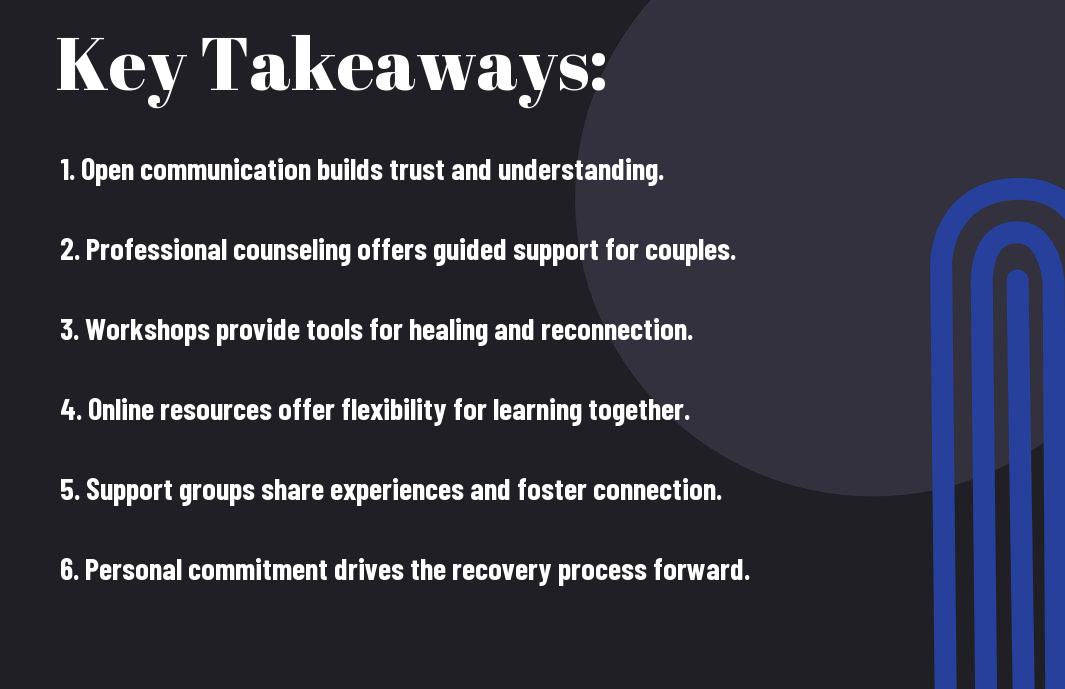Many couples face the devastating impact of infidelity, which can leave you feeling lost and heartbroken. Fortunately, there are affair recovery programs designed to help you rebuild trust and heal your relationship. In this blog post, we’ll explore the top five options available to assist you in saving your marriage, providing you with the tools and strategies necessary for effective communication, emotional healing, and renewed intimacy. You can take positive steps toward recovery and restoration, transforming your relationship into something even stronger than before.
Key Takeaways:
- Affair recovery programs offer structured support and guidance for couples dealing with infidelity.
- Professional counseling can provide a safe environment for couples to explore underlying issues contributing to the affair.
- Workshops and retreats focused on relationship healing can help partners regain intimacy and connection.
- Online programs offer flexibility and accessibility, allowing couples to work through recovery at their own pace.
- Support groups provide a community of individuals facing similar challenges, fostering shared experiences and healing.
- Cognitive Behavioral Therapy (CBT) techniques can help couples address negative thought patterns and behaviors related to the affair.
- Long-term commitment to the recovery process is imperative for rebuilding trust and strengthening the marriage.

Understanding the Impact of Infidelity
Your understanding of the impact of infidelity is key to navigating the tumultuous waters of affair recovery. Infidelity can shatter the foundation of trust and love in your marriage, leading to a myriad of emotional and relational challenges. It is crucial to recognize and address these effects to rebuild your relationship and foster healing moving forward.
Emotional Consequences
Across the landscape of infidelity, the emotional consequences are profound and far-reaching. You may experience feelings of betrayal, anger, sadness, and hopelessness, which can cloud your judgment and complicate your desire to move forward. Processing these emotions together with your partner can be the first step toward healing.
Trust Issues
By acknowledging trust issues, you pave the way for rebuilding your marriage after infidelity. The breach of trust can lead to persistent doubts and insecurities in your relationship. Every step taken must prioritize transparency and open communication to alleviate distress and rebuild confidence in one another.
In fact, trust issues can create an ongoing cycle of suspicion and fear, hindering the healing process. You may find yourself questioning your partner’s actions and intentions, even after sincere efforts to reconcile. To combat this, both partners need to engage in an honest dialogue about feelings and expectations. Working together to establish boundaries and seeking mutual understanding can significantly improve your journey back to trust. Ultimately, consistency and reassurance from your partner will play a decisive role in restoring your faith in the marriage.

Counseling and Therapy Options
Some couples find that participating in counseling and therapy can significantly aid in the recovery process after an affair. Engaging with a trained professional helps address the underlying issues in your relationship and fosters open communication. It gives both partners a safe space to express their feelings and work together towards rebuilding trust and intimacy.
Couples Therapy
After infidelity, couples therapy provides a platform for you and your partner to explore the emotions surrounding the affair. A therapist guides you through discussions that help identify the root causes of the betrayal, enabling both of you to understand each other’s perspectives. This process can create a sense of safety and encourage reconciliation.
Individual Therapy
Between sessions of couples therapy, individual therapy can be beneficial for both partners. This space allows you to process your feelings about the affair and your relationship on a personal level, offering tools to better cope with the emotional fallout. It can be especially helpful if you are struggling with feelings of shame, betrayal, or anger.
It is important to recognize how individual therapy can empower you to heal personally while navigating the complexities of your marriage situation. This one-on-one time with a therapist allows you to identify and address your emotional triggers and stress responses, leading to greater self-awareness. Moreover, it supports building a strong foundation for positively contributing to your relationship recovery. By tackling your personal challenges, you can move towards a healthier interaction with your partner, ultimately enhancing both individual and shared well-being.
Support Groups and Workshops
Now, engaging in support groups and workshops can be incredibly beneficial when navigating the complexities of affair recovery. These programs offer a structured environment for couples to explore their emotions, communicate more effectively, and gain insights from others who have faced similar challenges. By participating in these sessions, you can learn valuable tools to rebuild trust and enhance your relationship, setting a foundation for lasting healing.
Peer Support Groups
At peer support groups, you can connect with others who have experienced similar circumstances, fostering an understanding of your feelings in a safe space. Sharing your story and listening to others helps build empathy, while also providing opportunities for learning from different perspectives. Hearing personal experiences can bolster your resolve and offer hope as you work toward recovery.
Intensive Workshops
Any intensive workshop offers a focused approach to your healing journey, often spanning several days filled with interactive exercises, educational sessions, and guided discussions. These workshops are designed to address the specific dynamics of infidelity, providing structured support from trained professionals who specialize in relationship recovery.
With intensive workshops, you can expect immersive experiences that challenge you to confront underlying issues and explore effective communication strategies. These programs typically include individual, couple, and group therapy sessions to facilitate deep healing and insight. As you engage with other couples in the same situation, you will share vulnerabilities and triumphs, fostering a sense of community and understanding. The dedicated time set aside for this intensive work offers an opportunity to make significant progress, giving you both the tools and motivation needed for lasting change in your relationship.

Online Resources and Programs
Not all recovery methods require face-to-face interaction; numerous online resources and programs can provide valuable support for you and your partner. Accessing digital platforms allows you to explore various tools and methods at your own pace, making it easier to integrate them into your life. From guided courses to community forums, these options can offer an effective way to engage with your healing process, no matter where you are on this journey.
Self-Help Online Courses
Behind many successful marriages is an understanding of each other’s needs, which can be cultivated through self-help online courses. You can find numerous programs catered toward addressing infidelity and relationship repair, often designed by experienced professionals in the field. These structured courses allow you to work through your feelings, gain new perspectives, and implement practical strategies in your daily routine.
Virtual Counseling Services
SelfHelp platforms are emerging as a viable alternative for couples seeking resolution after infidelity. With virtual counseling services, you can connect with licensed therapists who specialize in relationship recovery. These services offer convenience, as you can attend sessions from the comfort of your home. Additionally, they often provide custom-tailored support through different formats, such as video calls, chat, or phone sessions. Ensure you choose a reputable counselor, as this can significantly impact your journey towards rebuilding trust and intimacy.
Courses typically include interactive modules that guide you through important topics like communication, rebuilding trust, and emotional healing. You’ll engage with valuable exercises and reflection prompts that help address underlying issues in your relationship. Many programs also offer community support, allowing you to interact with others facing similar challenges, which may help you feel less isolated in your struggle. Choosing the right courses can be a transforming step towards a healthier, more resilient relationship.
Communication Strategies for Recovery
Many couples face challenges after infidelity, making effective communication necessary for healing. Engaging in open discussions can help you both understand each other’s feelings and perspectives. For more guidance, check out How To Save A Marriage After An Affair, which provides valuable resources for navigating this difficult time.
Open and Honest Dialogues
For healing to begin, you need to engage in open and honest dialogues with your partner. This means expressing your thoughts and feelings without fear of judgment while also actively listening to their side. These conversations can foster a deeper understanding and rebuild trust.
Setting Boundaries and Expectations
Between you and your partner, establishing clear boundaries and expectations is necessary for a healthy recovery process. This involves defining what behaviors are acceptable moving forward and what steps both of you are committed to taking to restore the relationship.
Expectations should be clearly communicated and agreed upon to avoid misunderstandings. Discuss what is allowed and what is not, ensuring that both partners feel comfortable and respected. Setting these boundaries can protect your healing journey from further emotional turmoil, keeping you focused on rebuilding trust and creating a stronger connection moving forward.
Rebuilding Trust and Intimacy
To effectively rebuild trust and intimacy in your marriage after an affair, it’s crucial to engage in open and honest communication. Sharing your feelings, listening to your partner, and working collaboratively towards understanding can help mend the emotional wounds that have been inflicted. Focus on creating a safe environment where both of you feel secure expressing vulnerabilities, ultimately fostering a deeper connection than before.
Shared Activities and Quality Time
After experiencing an affair, dedicating time to shared activities is vital for healing. Spend quality time together, whether through hobbies, date nights, or simple everyday routines, to strengthen your bond and create new, positive memories. Engaging in fun and meaningful experiences can help restore a sense of partnership and collaboration.
Practicing Forgiveness
One of the most challenging yet rewarding aspects of affair recovery is practicing forgiveness. This process involves letting go of the pain and resentment that has built up over time, allowing both partners to heal and move forward together. Acknowledging your feelings and expressing them is part of this journey; however, holding on to anger can hinder your relationship’s progress.
Considering forgiveness means embracing the understanding that both you and your partner are human and make mistakes. It involves a conscious decision to release the hurt while actively working toward rebuilding trust. This process may take time and requires you to communicate openly about your feelings and expectations. By fostering a supportive environment, you can gradually learn to let go of past grievances and encourage a stronger, more resilient relationship moving forward.
FAQ
Q: What are Affair Recovery Programs?
A: Affair Recovery Programs are structured approaches designed to help couples navigate the challenges that arise after infidelity. These programs typically provide support, resources, and guidance to help both partners understand the underlying issues, communicate effectively, and rebuild trust in their marriage.
Q: What are the top options available for Affair Recovery Programs?
A: The top five options for Affair Recovery Programs include:
1. Couples Therapy – Working with a licensed therapist who specializes in infidelity can provide personalized support.
2. Retreats or Workshops – Intensive programs held in retreat settings can help couples focus solely on healing their relationship over a few days.
3. Online Counseling – Virtual therapy sessions allow couples to access professional help from the comfort of their own home.
4. Self-Help Resources – Books, podcasts, and online courses can offer insight and tools for couples wanting to navigate recovery at their own pace.
5. Support Groups – Programs that facilitate group discussions can help couples connect with others experiencing similar challenges, fostering community support.
Q: How do these programs help in rebuilding trust?
A: Affair Recovery Programs offer strategies for open communication, accountability, and vulnerability. They encourage both partners to express feelings and concerns in a safe environment. Through structured exercises and discussions, couples learn to acknowledge the pain caused by infidelity, promote empathy, and develop a plan for long-term trust-building, which may include setting boundaries and improving transparency.
Q: How do I choose the right Affair Recovery Program for my marriage?
A: Choosing the right program depends on several factors, including your specific needs, preferences, and the nature of your relationship. Consider whether you prefer individual or group support, in-person or online sessions, and the background of the professionals involved. It’s also necessary to assess the program’s approaches and whether they align with your values and comfort level.
Q: Is it possible for a marriage to recover after an affair?
A: Yes, many couples successfully rebuild their marriages after an affair. Recovery takes time, dedication, and a genuine willingness from both partners to engage in the healing process. Affair Recovery Programs can facilitate this journey by providing tools and support required to ensure both individuals feel heard, valued, and committed to moving forward together.
